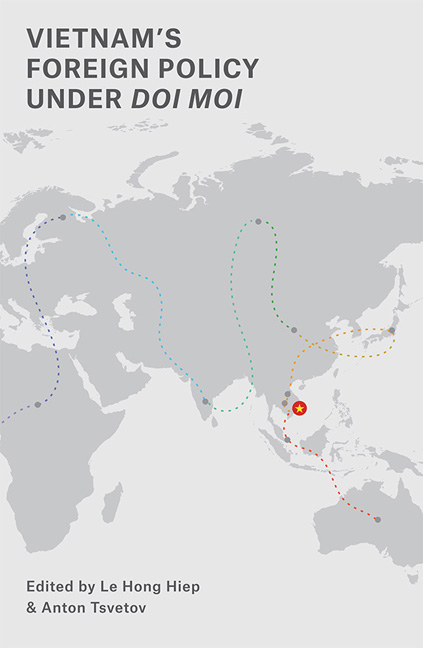Book contents
- Frontmatter
- Contents
- List of Tables
- List of Figures
- List of Abbreviations
- Acknowledgements
- About the Contributors
- PART I ANALYTICAL AND HISTORICAL FRAMEWORK
- 1 Introduction: The Making of Vietnam's Foreign Policy under Doi Moi
- 2 The Evolution of Vietnamese Diplomacy, 1986–2016
- PART II BILATERAL RELATIONSHIPS
- PART III MAJOR FOREIGN POLICY ISSUES
- Index
1 - Introduction: The Making of Vietnam's Foreign Policy under Doi Moi
from PART I - ANALYTICAL AND HISTORICAL FRAMEWORK
Published online by Cambridge University Press: 04 July 2018
- Frontmatter
- Contents
- List of Tables
- List of Figures
- List of Abbreviations
- Acknowledgements
- About the Contributors
- PART I ANALYTICAL AND HISTORICAL FRAMEWORK
- 1 Introduction: The Making of Vietnam's Foreign Policy under Doi Moi
- 2 The Evolution of Vietnamese Diplomacy, 1986–2016
- PART II BILATERAL RELATIONSHIPS
- PART III MAJOR FOREIGN POLICY ISSUES
- Index
Summary
Since Vietnam launched its economic reforms under Doi Moi in 1986, foreign policy has been an essential tool for the ruling Communist Party of Vietnam (CPV) to facilitate the implementation of its domestic agenda. As the CPV considers foreign policies as the extension of domestic ones, the Party has consistently sought to make use of external relations to enhance the country's national security and prosperity, and, ultimately, to strengthen the Party's rule. Understanding Vietnam's foreign policy is therefore necessary for one to fully appreciate the transformations that Vietnam has undergone since the adoption of Doi Moi.
This chapter serves as a background for readers to understand the making of Vietnam's contemporary foreign policy before examining its various aspects in subsequent chapters. The chapter first provides an overview of key drivers, objectives, principles, and actors involved in the making of Vietnam's foreign policy. It then assesses transformations in Vietnam's foreign policy under Doi Moi by examining major political and policy documents released by the CPV and how these changes have been translated into actual developments of the country's foreign relations. Finally, the chapter discusses several contemporary foreign policy challenges that Vietnam is facing before providing a summary of the book's structure.
The Making of Vietnam's Foreign Policy
Unlike democratic countries where government changes may lead to foreign policy shifts, Vietnam's foreign policy is fairly stable thanks to the continuity maintained under the country's one-party system. As “the force leading the state and society”, the CPV single-mindedly dictates Vietnam's foreign policy, and the country's foreign policy is therefore also the foreign policy of the Party. On the one hand, the stability and predictability in Vietnam's foreign policy lends it credibility, and thus the international community's confidence in its external commitments. On the other hand, the convergence of national interest with the CPV's interest in foreign policymaking renders it impossible to determine how much each weighs in the country's actual policies. In certain cases, the Party's ideological considerations and regime security concerns may interfere to dictate the country's foreign policy in ways that cannot be fully accounted for by national interests (see, for example, Co 2003; Hiep 2013a).
- Type
- Chapter
- Information
- Vietnam's Foreign Policy under Doi Moi , pp. 3 - 22Publisher: ISEAS–Yusof Ishak InstitutePrint publication year: 2018



